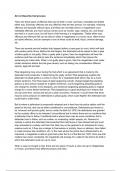Exam (elaborations)
WJEC Unit 3 Criminology AC 2.2 Describe trial process
- Module
- Crime Scene to Courtroom
- Institution
- WJEC
WJEC Unit 3 Criminology AC 2.2 Describe trial process Received an A for this exam. For personal use only, do not copy this work
[Show more]




